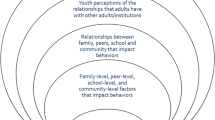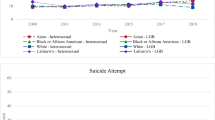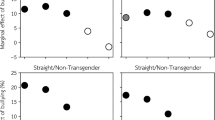Abstract
Research consistently shows that victims of bullying are at an elevated risk of developing health and mental health problems, especially internalizing problems, alcohol use, and suicidal thoughts and behaviors. The current study investigates whether adolescents who reported writing about violence are less at risk of internalizing problems, suicide ideation, and alcohol use when they are victims of bullying. The study sample included youth who participated in the Resilience Project (N = 638; 54% Female; Mean age = 15.8 years), which examined risky sexual behaviors among African American adolescents in four neighborhoods in Chicago’s Southside. The sample was primarily of low socioeconomic status, with about 75% receiving some form of government assistance. Findings show mixed support for a protective association between reporting writing about violence and each outcome. Contrary to our hypothesis, youth who reported writing about violence showed higher internalizing problems and suicide ideation. However, reporting writing about violence significantly moderated the association between bullying victimization and suicide ideation. It also moderated the association between bullying victimization and alcohol use. The interaction for suicide ideation confirmed the positive association between reporting writing about violence and suicide ideation. In contrast, the interaction with alcohol use showed a protective association but only for youth with high bullying victimization. Reporting writing about violence independently moderated the association between bullying victimization and suicide ideation, and bullying victimization and alcohol use. These findings have implications for practice and future research.




Similar content being viewed by others
Data Availability
The data are not publicly available due to privacy and confidentiality reasons.
References
Baiden, P., & Tadeo, S. K. (2019). Examining the association between bullying victimization and prescription drug misuse among adolescents in the United States. Journal of Affective Disorders, 259, 317–324. https://doi.org/10.1016/j.jad.2019.08.063
Baikie, K. A., & Wilhelm, K. (2005). Emotional and physical health benefits of expressive writing. Advances in Psychiatric Treatment, 11(5), 338–346. https://doi.org/10.1192/apt.11.5.338
Baikie, K. A., Geerligs, L., & Wilhelm, K. (2012). Expressive writing and positive writing for participants with mood disorders: An online randomized controlled trial. Journal of Affective Disorders, 136(3), 310–319. https://doi.org/10.1016/j.jad.2011.11.032
Bannink, R., Broeren, S., van de Looij–Jansen, P. M., de Waart, F. G., & Raat, H. (2014). Cyber and traditional bullying victimization as a risk factor for mental health problems and suicidal ideation in adolescents. PloS One, 9(4), e94026. https://doi.org/10.1371/journal.pone.0094026
Basile, K. C., Clayton, H. B., DeGue, S., Gilford, J. W., Vagi, K. J., Suarez, N. A., & Lowry, R. (2020). Interpersonal Violence victimization among high school students—youth risk behavior survey, United States, 2019. MMWR Supplements, 69(1), 28–37. https://doi.org/10.15585/mmwr.su6901a4
Bauer, N. S., Lozano, P., & Rivara, F. P. (2007). The effectiveness of the Olweus Bullying Prevention Program in public middle schools: A controlled trial. Journal of Adolescent Health, 40(3), 266–274. https://doi.org/10.1016/j.jadohealth.2006.10.005
Beduna, K. N., & Perrone-McGovern, K. M. (2019). Recalled childhood bullying victimization and shame in adulthood: The influence of attachment security, self-compassion, and emotion regulation. Traumatology, 25(1), 21–32. https://doi.org/10.1037/trm0000162
Bollen, K., & Lennox, R. (1991). Conventional wisdom on measurement: A structural equation perspective. Psychological Bulletin, 110(2), 305–134. https://doi.org/10.1037/0033-2909.110.2.305
Bottiani, J. H., Duran, C. A., Pas, E. T., & Bradshaw, C. P. (2019). Teacher stress and burnout in urban middle schools: Associations with job demands, resources, and effective classroom practices. Journal of School Psychology, 77, 36–51. https://doi.org/10.1016/j.jsp.2019.10.002
Brewer, S. L. Jr., Brewer, H. J., & Kulik, K. S. (2018). Bullying victimization in schools: Why the whole school, whole community, whole child model is essential. Journal of School Health, 88(11), 794–802. https://doi.org/10.1111/josh.12686
Carey-Webb, A. (1995). Youth Violence and the language arts: A topic for the classroom. The English Journal, 84(5), 29–37. https://doi.org/10.2307/820005
Center for Prevention Research & Development (2019). Illinois Youth Survey: Chicago community area reports. https://iys.cprd.illinois.edu/results/CCA/
Centers for Disease Control and Prevention (2019). 1991–2019 high school youth risk behavior survey datahttps://yrbs-explorer.services.cdc.gov/#/graphs?questionCode=H26&topicCode=C01&location=XX&year=2019.
Claes, L., Luyckx, K., Baetens, I., Van de Ven, M., & Witteman, C. (2015). Bullying and victimization, depressive mood, and non-suicidal self-injury in adolescents: The moderating role of parental support. Journal of Child and Family Studies, 24(11), 3363–3371. https://doi.org/10.1007/s10826-015-0138-2
Corcoran, M., Danziger, S. K., Kalil, A., & Seefeldt, K. S. (2000). How welfare reform is affecting women’s work. Annual Review of Sociology, 26, 241–269.
Deblinger, E., Mannarino, A. P., Cohen, J. A., Runyon, M. K., & Steer, R. A. (2011). Trauma-focused cognitive behavioral therapy for children: Impact of the trauma narrative and treatment length. Depression and Anxiety, 28(1), 67–75. https://doi.org/10.1002/da.20744
Derogatis, L. R. (2000). Brief Symptom Inventory-18. NCS Pearson.
Eastman, M., Foshee, V., Ennett, S., Sotres-Alvarez, D., Reyes, H. L. M., Faris, R., & North, K. (2018). Profiles of internalizing and externalizing symptoms associated with bullying victimization. Journal of Adolescence, 65, 101–110. https://doi.org/10.1016/j.adolescence.2018.03.007
Esposito, C., Affuso, G., Amodeo, A. L., Dragone, M., & Bacchini, D. (2021). Bullying victimization: Investigating the unique contribution of homophobic bias on adolescent non-suicidal self-injury and the buffering role of school support. School Mental Health, 13(2), 420–435. https://doi.org/10.1007/s12310-021-09434-w
Espelage, D. L., & Holt, M. K. (2001). Bullying and victimization during early adolescence: Peer influences and psychosocial correlates. Journal of Emotional Abuse, 2(2-3), 123–142. https://doi.org/10.1300/J135v02n02_08
Espelage, D. L. (2016). Leveraging school-based research to inform bullying prevention and policy. American Psychologist, 71(8). 768–775. https://doi.org/10.1037/amp0000095
Farrell, A. H., Volk, A. A., & Vaillancourt, T. (2020). Empathy, exploitation, and adolescent bullying perpetration: A longitudinal social-ecological investigation. Journal of Psychopathology and Behavioral Assessment, 42(3), 436–449. https://doi.org/10.1007/s10862-019-09767-6
Gaffney, H., Ttofi, M. M., & Farrington, D. P. (2021). Effectiveness of school-based programs to reduce bullying perpetration and victimization: An updated systematic review and meta‐analysis. Campbell Systematic Reviews, 17(2), e1143. https://doi.org/10.1002/cl2.1143
Gaylord-Harden, N. K., & Voisin, D. R. (2012). The coping with community violence scale. Unpublished manuscript.
Gortner, E. M., Rude, S. S., & Pennebaker, J. W. (2006). Benefits of expressive writing in lowering rumination and depressive symptoms. Behavior Therapy, 37(3), 292–303. https://doi.org/10.1016/j.beth.2006.01.004
Hymel, S., & Swearer, S. M. (2015). Four decades of research on school bullying: An introduction. American Psychologist, 70(4), 293–299. https://doi.org/10.1037/a0038928
Jiménez-Barbero, J. A., Ruiz-Hernández, J. A., Llor-Zaragoza, L., Pérez-García, M., & Llor-Esteban, B. (2016). Effectiveness of anti-bullying school programs: A meta-analysis. Children and Youth Services Review, 61, 165–175. https://doi.org/10.1016/j.childyouth.2015.12.015
Kacewicz, E., Slatcher, R. B., & Pennebaker, J. W. (2007). Expressive writing: An alternative to traditional methods. In L. L’Abate (Ed.), Low-cost approaches to promote physical and mental health: Theory, research, and practice (pp. 271–284). Springer.
Kenny, D. (2015). Measuring model fit. http://davidakenny.net/cm/fit.htm
Kliethermes, M. D., Drewry, K., & Wamser-Nanney, R. (2017). Trauma-focused cognitive behavioral therapy. In M. A. Landolt, M. Cloitre, & U. Schnyder (Eds.), Evidence-based treatments for trauma related disorders in children and adolescents (pp. 167–186). Springer International Publishing.
Kwon, H. J., Kang, Y. S., & Kim, J. E. (2008). Effects of cognitive-behavioral group counselling on the self-esteem and interpersonal skills of school bullying victims. Journal of Fisheries and Marine Sciences Education, 20(1), 46–57.
Lazarus, R., & Folkman, S. (1984). Stress, appraisal and coping. Springer Publishing Company, Inc.
Lee, J. (2021). Pathways from childhood bullying victimization to young adult depressive and anxiety symptoms. Child Psychiatry & Human Development, 52(1), 129–140. https://doi.org/10.1007/s10578-020-00997-4
Lee, J., Roh, B. R., & Yang, K. E. (2022). Exploring the association between social support and patterns of bullying victimization among school-aged adolescents. Children and Youth Services Review, 136, 106418. https://doi.org/10.1016/j.childyouth.2022.106418
Lepore, S. J., Greenberg, M. A., Bruno, M., & Smyth, J. M. (2002). Expressive writing and health: Self-regulation of emotion-related experience, physiology, and behavior. In S. J. Lepore, & J. M. Smyth (Eds.), The writing cure: How expressive writing promotes health and emotional well-being (pp. 99–117). American Psychological Association. https://doi.org/10.1037/10451-005
Mariën, S., Poels, K., & Vandebosch, H. (2022, February). Think positive, be positive: Expressive writing changes young people’s emotional reactions towards the COVID-19 pandemic. Frontiers in Education, 6, 755896. https://doi.org/10.3389/feduc.2021.755896
Mesghina, A., & Richland, L. E. (2020). Impacts of expressive writing on children’s anxiety and mathematics learning: Developmental and gender variability. Contemporary Educational Psychology, 63, 101926. https://doi.org/10.1016/j.cedpsych.2020.101926
Meshberg-Cohen, S., Svikis, D., & McMahon, T. J. (2014). Expressive writing as a therapeutic process for drug-dependent women. Substance Abuse, 35(1), 80–88. https://doi.org/10.1080/08897077.2013.805181
Mîndrilã, D. (2010). Maximum likelihood (ML) and diagonally weighted least squares (DWLS) estimation procedures: A comparison of estimation bias with ordinal and multivariate non-normal data. International Journal of Digital Society, 1(1), 60–66.
Miranda, R., Oriol, X., Amutio, A., & Ortúzar, H. (2019). Adolescent bullying victimization and life satisfaction: Can family and school adult support figures mitigate this effect? Revista De Psicodidáctica (English Ed), 24(1), 39–45. https://doi.org/10.1016/j.psicoe.2018.07.001
Moore, S. E., Norman, R. E., Suetani, S., Thomas, H. J., Sly, P. D., & Scott, J. G. (2017). Consequences of bullying victimization in childhood and adolescence: A systematic review and meta-analysis. World Journal of Psychiatry, 7(1), 60–76. https://doi.org/https://doi.org/10.5498%2Fwjp.v7.i1.60.
Muthén, B., & Muthén, L. (2017). Mplus. Handbook of item response theory. Chapman and Hall/CRC.
Múzquiz, J., Pérez-García, A. M., & Bermúdez, J. (2022). Relationship between direct and relational bullying and emotional well-being among adolescents: The role of self-compassion. Current Psychology, 1–9. https://doi.org/10.1007/s12144-022-02924-3
Nation, M., Christens, B. D., Bess, K. D., Shinn, M., Perkins, D. D., & Speer, P. W. (2020). Addressing the problems of urban education: An ecological systems perspective. Journal of Urban Affairs, 42(5), 715–730. https://doi.org/10.1080/07352166.2019.1706847
Neighbors, C., Riggs, J. L., Young, C. M., Rodriguez, L. M., Angosta, J., Cunningham-Erdogdu, P., & Lu, Q. (2020). Guilt and expressive writing for reducing alcohol use in college students: Study protocol for a randomized control trial. Contemporary Clinical Trials, 97, 106107. https://doi.org/10.1016/j.cct.2020.106107
Nixon, C. L., Jairam, D., Davis, S., Linkie, C. A., Chatters, S., & Hodge, J. J. (2020). Effects of students’ grade level, gender, and form of bullying victimization on coping strategy effectiveness. International Journal of Bullying Prevention, 2(3), 190–204. https://doi.org/10.1007/s42380-019-00027-5
Pengpid, S., & Peltzer, K. (2019). Bullying victimization and externalizing and internalizing symptoms among in-school adolescents from five ASEAN countries. Children and Youth Services Review, 106, 104473. https://doi.org/10.1016/j.childyouth.2019.104473
Pennebaker, J. W., & Chung, C. K. (2011). Expressive writing: Connections to physical and mental health. In H. S. Friendman (Ed.), The Oxford handbook of health psychology (pp. 417–437). Oxford University Press.
Peterson, S. E., Williams, R. C., Myer, R. A., & Tinajero, J. V. (2016). Experiences of middle-level students, teachers, and parents in the do the write thing Violence prevention program. Journal of Educational Research and Practice, 6(1), 66–89. https://doi.org/10.5590/JERAP.2016.06.1.05
Polanin, J. R., Espelage, D. L., Grotpeter, J. K., Ingram, K., Michaelson, L., Spinney, E., Valido, A., El Sheikh, A., Torgal, C., & Robinson, L. (2021). A systematic review and meta-analysis of interventions to decrease cyberbullying perpetration and victimization. Prevention Science, 1–16. https://doi.org/10.1007/s11121-021-01259-y
Potard, C., Kubiszewski, V., Combes, C., Henry, A., Pochon, R., & Roy, A. (2022). How adolescents cope with bullying at school: Exploring differences between pure victim and bully-victim roles. International Journal of Bullying Prevention, 4(2), 144–159. https://doi.org/10.1007/s42380-021-00095-6
Price, J. H., & Khubchandani, J. (2019). The changing characteristics of African-American adolescent suicides, 2001–2017. Journal of Community Health, 44(4), 756–763. https://doi.org/10.1007/s10900-019-00678-x
Priesman, E., Newman, R., & Ford, J. A. (2018). Bullying victimization, binge drinking, and marijuana use among adolescents: Results from the 2013 National Youth Risk Behavior Survey. Journal of Psychoactive Drugs, 50(2), 133–142. https://doi.org/10.1080/02791072.2017.1371362
Quartz, K. (2003). Too angry to leave:’ supporting new teachers’ commitment to transform urban schools. Journal of Teacher Education, 54(2), 99–111. https://doi.org/10.1177/0022487102250284
Rivers, I., & Noret, N. (2013). Potential Suicide ideation and its association with observing bullying at school. Journal of Adolescent Health, 53, S32–S36. https://doi.org/10.1016/j.jadohealth.2012.10.279
Russell, S. T., Ryan, C., Toomey, R. B., Diaz, R. M., & Sanchez, J. (2011). Lesbian, gay, bisexual, and transgender adolescent school victimization: Implications for young adult health and adjustment. Journal of School Health, 81, 223–230. https://doi.org/10.1111/j.1746-1561.2011.00583.x
Sacco, D., Baird Silbaugh, K., Corredor, F., Casey, J., & Doherty, D. (2012). An overview of state anti-bullying legislation and other related laws. Berkman Center Research Publication, (2013-4). http://cyber.law.harvard.edu/files/State_Anti_bullying_Legislation_Overview_0.pdfhttps://doi.org/10.2139/ssrn.2197961
Şahin, M. (2012). An investigation into the efficiency of empathy training program on preventing bullying in primary schools. Children and Youth Services Review, 34(7), 1325–1330. https://doi.org/10.1016/j.childyouth.2012.03.013
Sampasa-Kanyinga, H., Roumeliotis, P., & Xu, H. (2014). Associations between cyberbullying and school bullying victimization and suicidal ideation, plans and attempts among Canadian schoolchildren. PloS One, 9(7), e102145. https://doi.org/10.1371/journal.pone.0102145
Stadler, C., Feifel, J., Rohrmann, S., Vermeiren, R., & Poustka, F. (2010). Peer-victimization and mental health problems in adolescents: Are parental and school support protective? Child Psychiatry & Human Development, 41(4), 371–386. https://doi.org/10.1007/s10578-010-0174-5
Syah, A. Y. (2023). The effect of expressive writing therapy in reducing anxiety levels in adolescent bullying victims. Babali Nursing Research, 4(3), 337–347. https://doi.org/10.37363/bnr.2023.43248
Tredway, L. (1999). The art of juggling: Preparing preservice teachers for urban schools. Journal of Negro Education, 68(3), 382–396. https://doi.org/10.2307/2668109
Young, C. M., Rodriguez, L. M., & Neighbors, C. (2013). Expressive writing as a brief intervention for reducing drinking intentions. Addictive Behaviors, 38(12), 2913–2917. https://doi.org/10.1016/j.addbeh.2013.08.025
Young-Jones, A., Fursa, S., Byrket, J. S., & Sly, J. S. (2015). Bullying affects more than feelings: The long-term implications of victimization on academic motivation in higher education. Social Psychology of Education, 18(1), 185–200. https://doi.org/10.1007/s11218-014-9287-1
Zhou, Z. K., Liu, Q. Q., Niu, G. F., Sun, X. J., & Fan, C. Y. (2017). Bullying victimization and depression in Chinese children: A moderated mediation model of resilience and mindfulness. Personality and Individual Differences, 104, 137–142. https://doi.org/10.1016/j.paid.2016.07.040
Zhu, X., Griffiths, H., Eisner, M., Hepp, U., Ribeaud, D., & Murray, A. L. (2022). Developmental relations between bullying victimization and suicidal ideation in middle adolescence and emerging adulthood: Do internalizing problems and substance use mediate their links? Journal of Youth and Adolescence, 1–15. https://doi.org/10.1007/s10964-022-01630-4
Funding
This study was funded by the Center for Health Administration Studies and the STI/HIV Intervention Network at the University of Chicago, which were awarded to Dr. Dexter R. Voisin.
Author information
Authors and Affiliations
Contributions
The study was approved by the Institutional Review Board of the last author’s previous institution. The last author collected the data for the study, and all the authors take responsibility for the integrity of the data and the accuracy of the data analysis.
Corresponding author
Ethics declarations
Conflict of interest
The authors declare that there is no conflict of interest.
Ethics approval
There were no ethical issues concerning human participants/animals in the study.
Informed consent
Informed consent was obtained before the data collection. The data in this study are available upon request made to the last author.
Additional information
Publisher’s Note
Springer Nature remains neutral with regard to jurisdictional claims in published maps and institutional affiliations.
Rights and permissions
Springer Nature or its licensor (e.g. a society or other partner) holds exclusive rights to this article under a publishing agreement with the author(s) or other rightsholder(s); author self-archiving of the accepted manuscript version of this article is solely governed by the terms of such publishing agreement and applicable law.
About this article
Cite this article
Hong, J.S., Valido, A., Espelage, D.L. et al. Are adolescents in Chicago who report writing about violence less at risk of adverse outcomes when bullied?. Curr Psychol 43, 12462–12476 (2024). https://doi.org/10.1007/s12144-023-05328-z
Accepted:
Published:
Issue Date:
DOI: https://doi.org/10.1007/s12144-023-05328-z




